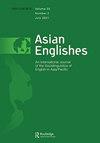Changing teacher learners’ language ideologies and pedagogical practices: an action research intervention in World Englishes
IF 1.8
Q1 LINGUISTICS
引用次数: 7
Abstract
ABSTRACT The growing recognition of the varieties of Englishes constituting the world Englishes (WE) and related paradigms calls for replacing teachers’ existing language ideologies with WE-oriented beliefs and preparing them to teach with WE awareness. Since WE has yet to be part of mainstream education and teacher education, formal and informal interventions are used by educators and researchers for teacher learning and professional development. How effective are such interventions in changing student-teachers’ language beliefs and practices? The action research reported in this article was conducted in a postgraduate Teaching English to Speakers of Other Languages (TESOL) course at an Australian university involving in-service and pre-service teachers mainly from Asia. We report some changes in the participants’ beliefs of English and their views of pedagogical practices. However, the major contribution of the research is noted in its reporting of pedagogical and methodological challenges for such interventions and drawing lessons for future research.改变教师-学习者的语言意识形态和教学实践:对《世界英语》的行动研究干预
摘要对构成世界英语(WE)的各种英语及其相关范式的日益认识,要求用以WE为导向的信念取代教师现有的语言意识形态,并让他们做好以WE意识进行教学的准备。由于WE尚未成为主流教育和教师教育的一部分,教育工作者和研究人员将正式和非正式干预措施用于教师学习和专业发展。这种干预措施在改变师生的语言信仰和实践方面有多有效?本文报道的行动研究是在澳大利亚一所大学的一门研究生英语教学课程中进行的,该课程涉及主要来自亚洲的在职和职前教师。我们报告了参与者对英语的信念和他们对教学实践的看法的一些变化。然而,该研究的主要贡献在于报告了此类干预措施在教学和方法上的挑战,并为未来的研究吸取了教训。
本文章由计算机程序翻译,如有差异,请以英文原文为准。
求助全文
约1分钟内获得全文
求助全文
来源期刊

Asian Englishes
LINGUISTICS-
CiteScore
3.30
自引率
18.80%
发文量
34
期刊介绍:
Asian Englishes seeks to publish the best papers dealing with various issues involved in the diffusion of English and its diversification in Asia and the Pacific. It aims to promote better understanding of the nature of English and the role which it plays in the linguistic repertoire of those who live and work in Asia, both intra- and internationally, and in spoken and written form. The journal particularly highlights such themes as: 1.Varieties of English in Asia – Including their divergence & convergence (phonetics, phonology, prosody, vocabulary, syntax, semantics, pragmatics, discourse, rhetoric) 2.ELT and English proficiency testing vis-a-vis English variation and international use of English 3.English as a language of international and intercultural communication in Asia 4.English-language journalism, literature, and other media 5.Social roles and functions of English in Asian countries 6.Multicultural English and mutual intelligibility 7.Language policy and language planning 8.Impact of English on other Asian languages 9.English-knowing bi- and multilingualism 10.English-medium education 11.Relevance of new paradigms, such as English as a Lingua Franca, to Asian contexts. 12.The depth of penetration, use in various domains, and future direction of English in (the development of) Asian Societies.
 求助内容:
求助内容: 应助结果提醒方式:
应助结果提醒方式:


